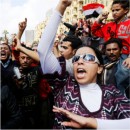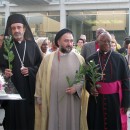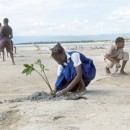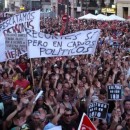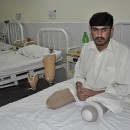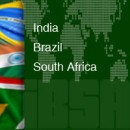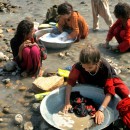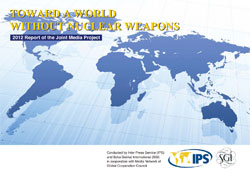Languages

Friday, March 29, 2013
Journalism and Communication for Global Change
Nuclear Energy - Nuclear Weapons
KIEV
Nuclear Safety Plan Has Ukrainians Worried
A 300 million euro loan to improve nuclear safety in the Ukraine has been attacked by environmental groups who say it will instead be used to keep ageing reactors working well beyond their planned lifespans – increasing the risks of a nuclear accident - while doing nothing to address serious issues with the country’s energy intensity.Iranian People Caught in Crossfire of Dueling Messages
Since Barack Obama became president of the United States, messages marking the Iranian New Year – Norouz - celebrated at the onset of spring have become yearly affairs. So have responses given by Iran’s Leader Ayatollah Ali Khamenei from the city of Mashhad where he makes a yearly pilgrimage to visit the shrine of Shi’i Islam’s eighth imam, Imam Reza.
Iran’s Nuclear Activities Go On Despite Sanctions
While the U.S.-led sanctions regime on Iran has produced substantial economic hardship, analysts here are increasingly pointing out that Tehran’s controversial nuclear activities have continued unabated.
Tug-of-War Over Nuclear Future
Pushed and pulled in opposite directions, the future of Japan’s energy plans in the wake of the accident at the Fukushima Daiichi nuclear power plant two years ago is emerging as a fight between national economic advancement and what anti-nuke activists call “the lives of the people”.
India Playing Risky Games at Nuclear Parks
Bhagwat Singh Gohil frets for the future of his bountiful orchards in Mithi Virdi village in western Gujarat state’s coastal district Bhavnagar. “After contending with droughts, rough seas and earthquakes we are staring at the possibility of a man-made disaster in the shape of a nuclear power park.”Pak-Iran Pipeline Carries Energy and Defiance
After almost two decades of non-stop negotiations, and two years of intense U.S. opposition, the much-delayed and controversial 7.5 billion dollar Iran-Pakistan pipeline is well on its track to full operation in the next 15 months.
Public Pays for Fukushima While Nuclear Industry Profits
Two years after Japan's Fukushima Daiichi nuclear disaster, the country faces 100 to 250 billion dollars in cleanup and compensation costs, tens of thousands of displaced people and widespread impacts of radiation.U.S. “Rebalancing” to Asia/Pacific Still a Priority
Amidst growing tensions with North Korea and, to a lesser extent, China, the White House Monday insisted that its “re-balancing” toward the Asia/Pacific remained on track and that Washington is fully committed to its allies there, especially Japan and South Korea.
Anti-Nuke Movement Goes to the Gulf
After a week of activities in Oslo during the Conference on the Humanitarian Impact of Nuclear Weapons, major anti-nuclear campaigners moved Monday to the Bahraini capital, Manama, in yet another step towards the abolition of atomic weapons.
Fukushima Running Out of Workers
Japan has promised to scrap the crippled Fukushima nuclear reactors that faced the world’s worst nuclear accident. But Hiroyuki Watanabe, councillor in Iwaki City located 30 kilometres from the accident site, greets such intentions on the second anniversary of the disaster on Monday with misgiving.
Tehran Mulls Almaty II Amid Hopes for More Give and Take
The meeting between Iran and the so-called P5+1 (five permanent members of the U.N. Security Council plus Germany) that took place in late February in Almaty, Kazakhstan was described as positive and even a "turning point" by Iran's chief nuclear negotiator, Saeed Jalili.
U.N. Security Council Hits N. Korea with New Sanctions
North Korea, which has survived three rounds of diplomatic and economic sanctions since its first nuclear test in 2006, reacted with predictable fury, threatening to nuke the United States, in retaliation for a Security Council resolution imposing new sanctions against Pyongyang.‘Humanitarian Diplomacy’ Fights Nukes
For the first time, ‘humanitarian diplomacy’ is being deployed to drive home the need for banning nukes - though under the self-imposed exclusion of the P5, the five permanent members of the UN Security Council, who own a crushing majority of the 19,000 nuclear weapons capable of destroying the world many times over.Poll Finds Mounting Hostility Among Arabs towards Iran
A poll released Tuesday shows a stark decline in favourability among Arab and Muslim citizens regarding the Iranian government and its policies.Ahead of March Iran Talks, U.S. Urged to Back Possible Israeli Strike
In the same week that talks between Iran and the P5+1 (the five permanent members of the U.N. Security Council plus Germany) concluded in Kazakhstan with rare positive Iranian feedback, a joint resolution declaring U.S. support for Israel in the event of an Israeli military strike on Iran's nuclear programme was brought before Congress.Next Page »







